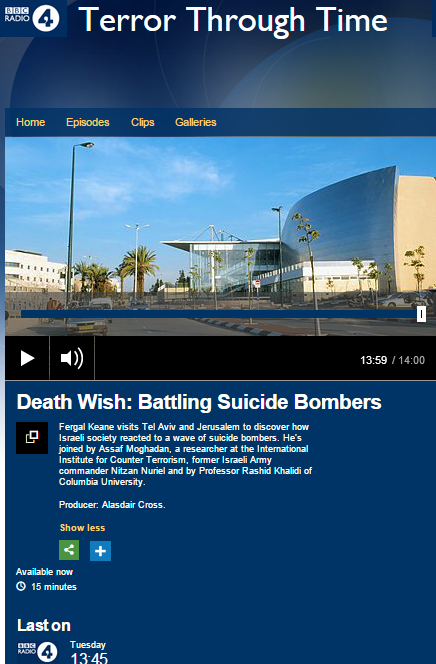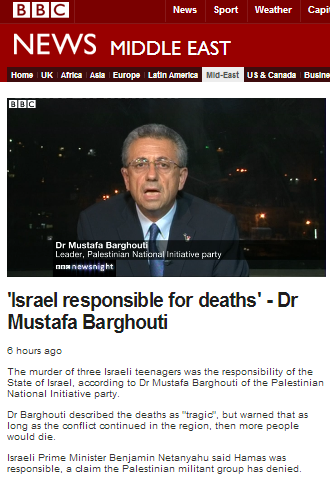On December 2nd another edition of the BBC Radio 4 series ‘Terror Through Time’ (presented by Fergal Keane) was broadcast under the title “Death Wish: Battling Suicide Bombers“. The programme’s synopsis reads as follows:
“Fergal Keane visits Tel Aviv and Jerusalem to discover how Israeli society reacted to a wave of suicide bombers. He’s joined by Assaf Moghadan, a researcher at the International Institute for Counter Terrorism, former Israeli Army commander Nitzan Nuriel and by Professor Rashid Khalidi of Columbia University.”
The programme begins with a recording of Bill Clinton speaking at the signing of the Oslo Accords in September 1993, after which Keane informs listeners:
“But within months, a new campaign of terrorism was bringing carnage to the streets of Jerusalem and Tel Aviv…”
Of course the post-Oslo terror campaign also took place in many additional locations in Israel besides its two largest cities, contrary to the inaccurate impression given by Keane. He goes on to interview Israeli film-maker Noam Sharon, stating “I’m here in the Old City of Jerusalem”. In fact, as Sharon states, the interview took place on Yoel Moshe Salomon street, which is not located in the Old City. After Sharon has described some of the suicide bombings which took place in that district in Jerusalem, Keane goes on to interview Assaf Moghadan and then states:
“By the 1990s the balance of power among the Palestinians was shifting. Islamist groups like Hamas and Islamic Jihad, as well as militant elements within Yasser Arafat’s Fatah, were opposed to the peace process. Support for a path of violent opposition to Israel would grow sharply in the wake of a massacre of Palestinians carried out at the Cave of the Patriarchs by a Jewish extremist.”
After a recording of an archive news bulletin, Keane once again inadequately introduces political activist cum academic Rashid Khalidi, failing to provide audiences with the crucial background summary of Khalidi’s “viewpoint” which would enable them to put his contribution into its appropriate context.
Keane: “Rashid Khalidi is professor of modern Arab studies at Colombia University, New York.”
Khalidi: “Suicide attacks were carried out in the wake of the Hebron Mosque massacre – the Haram al Ibrahimi massacre – by Baruch Goldstein in 1994, when dozens of worshippers were gunned down by this armed settler fanatic.”
But do the facts actually support Khalid’s claim? Suicide attacks had in fact already begun in 1989 with the one on the 405 bus carried out by the PIJ. Two attacks were carried out in 1993 by Hamas and in 1994 five attacks by Hamas took place. The years that followed showed a slight decline in suicide attacks – 1995: 4, 1996: 4, 1997: 3, 1998: 2, 1999: 2. The surge in suicide attacks actually came during the second Intifada which began six and a half years after Goldstein’s terror attack at the Cave of the Patriarchs – 2000: 5, 2001: 40, 2002: 47 attacks. Hence, Khalidi’s linkage is doubtful to say the least. Keane goes on to tell listeners:
“Rashid Khalidi says that Palestinian anger over a peace process that failed to stop the building of Jewish settlements on Palestinian land helped to create support for violent action against Israeli civilians.”
Of course Keane’s blind adoption and amplification of Khalidi’s politically motivated narrative means that he erases from audience view several vital points, one of which is the fact that the representatives of the Palestinian people willingly signed the Oslo Accords in which no limitation on Israeli (or Palestinian) building was stipulated. He also ignores the fact that construction in existing communities took place in Area C which, according to the terms of the Oslo Accords is to have its status determined in final status negotiations, making Keane’s description of that area as “Palestinian land” inaccurate and misleading.
Khalidi: “Instead of punishing the settlers by doing what a majority of his cabinet apparently wanted to do, which was to remove settlers from Hebron and perhaps even remove the Kiryat Arba settlement where the most fanatic, most extreme armed settlers were concentrated, Rabin did quite the opposite. He began the enforcement of incredibly restrictive conditions on the population of Hebron in the area where the Jewish settlers had set up in the city, such that it became clear to the Palestinians that the peace process was not delivering and to settlement and improvement of the situation for Palestinians: quite the contrary.”
Neither Khalidi nor Keane bother to inform listeners that the status of Hebron and the security arrangements there are the product of the Hebron Protocols – again willingly signed by the Palestinian leadership. Clearly that fact does not fit into Khalidi’s politically motivated narrative which portrays Palestinians exclusively as victims.
Keane then goes on to discuss with Ronen Bergman and Nitzan Nuriel Israel’s methods of coping with the wave of suicide bombings during the second Intifada before informing listeners that:
“The most profound, long-term impact was political. Suicide bombing created fear among the Israeli public and a sense of betrayal. Where were the promises of peace, they asked. And so voters gradually turned away from the likes of Shimon Peres and Ehud Barak of Labour and towards the right-wing in the form of Binyamin Netanyahu and Ariel Sharon. As suicide bombing reached its peak in 2002, Sharon ordered the army into West Bank towns controlled by the Palestinian Authority. Operation Defensive Shield was the largest military operation in the West Bank since the war of 1967. The compound of PLO leader Yasser Arafat was besieged and according to the United Nations, 497 Palestinians were killed along with 30 Israeli soldiers. Arafat was accused of supporting suicide bombers from the Al Aqsa Martyrs Brigades – a faction of his Fatah movement. Human Rights Watch said that while he didn’t have command responsibility, he bore a heavy political responsibility for the atrocities. More than a hundred people died in bomb attacks in Israel from March to May 2002.”
Notably, at no point in this programme is it clarified that Arafat was not only the leader of the PLO, but also the president of the Palestinian Authority. No mention is made of his instigation of the second Intifada and, as we see above, his role in financing that terror war is downplayed to the level of ambiguous “political responsibility”.
After discussing the role of the anti-terrorist fence in reducing suicide bombings with Assaf Moghadan, Keane once again turns his attentions away from counter-terrorism and towards politics.
“But Israel’s politics changed dramatically. The old existential fear dominated and produced governments for whom security – rather than a long-term pact with the Palestinians – became the primary focus. Along with this came the steady expansion of Jewish settlements on Palestinian land: a deep cause of Palestinian fury. For the Palestinian militants, instead of suicide bombers the new terrorism would see hundreds of rockets fired at Israeli civilians.”
So according to Keane’s version of events, it was “Jewish settlements” which caused “fury” which prompted the continuation of terror attacks against Israeli civilians, with the tactic changing from suicide bombings to rockets.
The one major hole in Keane’s inaccurate theory is of course that the majority of the thousands – not “hundreds”- of missile attacks from the Gaza Strip took place after Israel’s disengagement from that territory in 2005 – including the evacuation of all ‘settlements’ – and hence one can in fact see that Keane’s linkage between the Palestinian terror organisations’ activities and ‘settlements’ is fallacious to say the least.
Keane proceeds with a very odd question:
“As with the airline hijackings of the 1970s, the suicide bombing campaigns focused attention on the Palestinian cause. But did they improve living conditions or bring a Palestinian state any closer?”
Keane gives the last word to Khalidi.
“Well, I would argue that attacks carried out in particular during the second Intifada which began in 2000 – and those attacks really reached a peak in 2001/2002 with bus bombs and other atrocities all over Israeli cities – had a devastating effect on the Palestinians, not only in terms of public opinion but in terms of hardening Israeli opinion against the Palestinians in terms of unifying Israeli opinion around the most extreme right-wing positions in Israeli politics. So their ultimate impact, besides the havoc that the Israeli army wreaked on the Palestinians as part of the re-occupation of the tiny areas that they had originally evacuated as part of the Oslo Accords, the public opinion impact worldwide of the Palestinians blowing up buses – all of these things together in my view had a devastating impact on the Palestinians primarily. Obviously there was enormous suffering caused by the actual attacks, but strategically I would say the balance is entirely in Israel’s favour and that should be a strategic factor for any Palestinian political leader.”
In other words, BBC audiences are left with the message that suicide bombings are undesirable not because they are morally wrong or abhorrent, but because they do not serve the strategic interests of Palestinian public relations. They are also told that Israeli public opinion is ‘unified’ around “the most extreme right-wing positions in Israeli politics” – a claim not borne out by the results of the 2013 elections or those which went before them. Khalidi also erases the fact that Arafat’s campaign of terror actually coincided with an increase in foreign donor contributions to the Palestinian Authority and that continuing terrorism cannot be said to have had a detrimental effect upon the provision of foreign aid funding.
Ostensibly, Fergal Keane set out to explore in this programme “how Israeli society reacted to a wave of suicide bombers”. What he actually achieved was – once again – uncritical amplification of political messaging from the Rashid Khalidi show.





